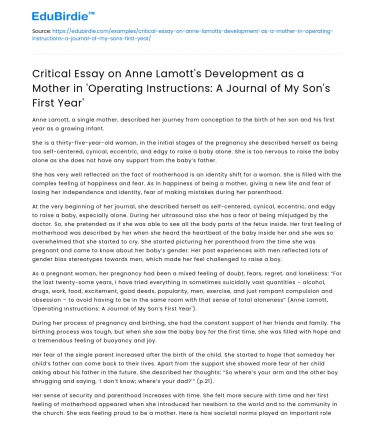Anne Lamott, a single mother, described her journey from conception to the birth of her son and his first year as a growing infant.
She is a thirty-five-year-old woman, in the initial stages of the pregnancy she described herself as being too self-centered, cynical, eccentric, and edgy to raise a baby alone. She is too nervous to raise the baby alone as she does not have any support from the baby’s father.
Save your time!
We can take care of your essay
- Proper editing and formatting
- Free revision, title page, and bibliography
- Flexible prices and money-back guarantee
She has very well reflected on the fact of motherhood is an identity shift for a woman. She is filled with the complex feeling of happiness and fear. As in happiness of being a mother, giving a new life and fear of losing her independence and identity, fear of making mistakes during her parenthood.
At the very beginning of her journal, she described herself as self-centered, cynical, eccentric, and edgy to raise a baby, especially alone. During her ultrasound also she has a fear of being misjudged by the doctor. So, she pretended as if she was able to see all the body parts of the fetus inside. Her first feeling of motherhood was described by her when she heard the heartbeat of the baby inside her and she was so overwhelmed that she started to cry. She started picturing her parenthood from the time she was pregnant and came to know about her baby’s gender. Her past experiences with men reflected lots of gender bias stereotypes towards men, which made her feel challenged to raise a boy.
As a pregnant woman, her pregnancy had been a mixed feeling of doubt, fears, regret, and loneliness: “For the last twenty-some years, I have tried everything in sometimes suicidally vast quantities – alcohol, drugs, work, food, excitement, good deeds, popularity, men, exercise, and just rampant compulsion and obsession – to avoid having to be in the same room with that sense of total aloneness” (Anne Lamott, 'Operating Instructions: A Journal of My Son’s First Year').
During her process of pregnancy and birthing, she had the constant support of her friends and family. The birthing process was tough, but when she saw the baby boy for the first time, she was filled with hope and a tremendous feeling of buoyancy and joy.
Her fear of the single parent increased after the birth of the child. She started to hope that someday her child’s father can come back to their lives. Apart from the support she showed more fear of her child asking about his father in the future. She described her thoughts: “So where’s your arm and the other boy shrugging and saying, ‘I don’t know; where’s your dad?’” (p.21).
Her sense of security and parenthood increases with time. She felt more secure with time and her first feeling of motherhood appeared when she introduced her newborn to the world and to the community in the church. She was feeling proud to be a mother. Here is how societal norms played an important role in Anne’s development as a mother and Sam’s acceptance into society as a newborn.






 Stuck on your essay?
Stuck on your essay?

